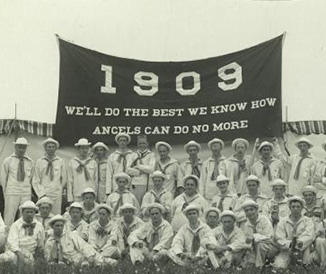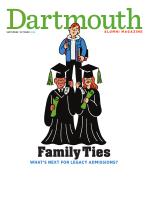Your Turn
Good Question
Thank you for the story appropriately questioning the administration on the lack of an Asian American studies program at Dartmouth [“The College Has No Asian American Studies Program. Why?” July/August]. I wish Dartmouth were more a step ahead of history instead of one or two behind it. I remember when I came to the College in the fall of 1976 from Pakistan, there were something like 17 foreign students. With a group of other international students, clustered in meetings at a tiny international house on the edge of campus, we began a low-key initiative to drive up this number through petitioning the administration and talking to various deans. Whether or not it was effective I will never know, but by the time I graduated the international student total had roughly doubled. Now it is so much better for international students, and diversity in general too (not to mention the women-to-men ratio), but I am hoping that on this and other issues of creating more inclusive and representative spaces, Dartmouth might one day not have to be pushed and pulled but will actually lead.
OMAR KHAN ’80
San Francisco
I want to express my gratitude for the article. The piece told an important story about the important work Asian American students and faculty have done—for so many years—to make Dartmouth’s campus more inclusive and its curriculum more complete. Please, Dartmouth, we need an Asian American studies program!
MARA CASEY TIEKEN ’01
New Gloucester, Maine
Although the “Asian American Student Activism at Dartmouth” course indeed seems to have been successful and no doubt provided a means to teach primary research in sociology, I disagree it is “a model” for what Asian American studies [AAS] courses could—should—look like. Rather than offering such boutique courses, Dartmouth would do well to offer AAS survey courses relevant to a variety of students and majors with some reliability, perhaps once a year. The lack of a systemized AAS program or department is part of the reason for the currently spotty curricular offerings.
JACQUELYN CHAPPEL ’96
Honolulu
The Scent Trail
Thank you for your very interesting article about the close ties between the Appalachian Trail and Dartmouth [“Take a Hike!” July/August]. In 1975 (my Sophomore Summer), some thru-hikers slept at Theta Delt at 11 West Wheelock Street. They appreciated the price points of the living room floor and the basement keg. As with the longer-term residents, showers were optional, at no extra charge.
TOM BARNICO ’77
Westwood, Massachusetts
Two Fronts
Thanks to professor Matthew Delmont for the crystal clarity brought to me in the phrase “For Black Americans, it was as much a fight against racial discrimination at home as against fascism abroad” during World War II [“Matthew Delmont,” July/August]. History is full of irony, and this statement helps punch home the tragedy for me. It’s moving.
KEVIN JONES ’87
Eugene, Oregon
Out of Toon
Targeting people for a fundamental part of their identity is wrong. Transgender people are people. We condemn DAM’s promotion of Steve Kelley ’81 [“Continuing Ed,” July/August]. DAM gave a platform to someone whose denigration of transgender people is a staple of his work. And DAM published online one of Kelley’s antitransgender cartoons. Directly above the cartoon, the title “It’s Okay to Laugh” apparently offers readers permission to join in on the joke. Is it really okay to laugh at the fact that nonbinary people exist? Freedom of expression is not an excuse for publishing hateful content.
Apparently, the rising level of vitriol against transgender people in the United States has normalized such hatred. We as a board call upon DAM to publicly apologize for publishing this profile and transphobic cartoon and to publicly affirm the right of transgender and nonbinary people to have their gender identities respected. To fall short of this is to fail to serve, as is DAM’s stated goal, “the entire Dartmouth family.”
Dartmouth LGBTQIA+ Alum Association, Board of Directors
Peter C. Williams ’76, Secretary
Unequal Expression
As a scholar of marriage who has worked in the field for upwards of 20 years, I want to express my deep disappointment with the decision to publish the letter from Timothy Michalak ’77 [July/August]. His attempt to link President Beilock’s fitness to lead the College with her marital status is specious at best and actionably offensive at worst. While Mr. Michalak is entitled to his views, the fact that this publication would see fit to give a prominent voice to them should be highly concerning to anyone who cares about the College’s commitment to gender equity.
SUZANNE LEONARD ’96
Winthrop, Massachusetts
Go Big Red!
I enjoyed the article about President Sian Beilock (“Sian Beilock” May/June), and I am incredibly excited to have her at Dartmouth’s helm.
I was surprised however, that the article did not mention Cornell president Martha Pollack ’79. I wanted to give a shout-out on her behalf.
Jennifer Hughes ’79
Wellesley, Massachusetts
In Search of Answers
Phil Hanlon ’77 made some good decisions as president, but these are unfortunately overshadowed by his appalling lack of leadership during the 2018-20 sexual assault and harassment lawsuit against the College. Despite promises of accountability and transparency, in the years since the College paid $14 million to settle the suit, Hanlon has never given credible answers to even the most reasonable questions surrounding his administration’s lack of action and accountability. Who in his administration was notified of the harassment against those students and when? Did the College continue to employ administrators who failed to take corrective steps even after the harassment came to light? Most important, did Hanlon sanction their continued employment and if so, why? By not giving the Dartmouth community sufficient explanation about his mistakes in this matter, Hanlon demonstrated an epic failure of leadership. Amid the gauzy retirement tributes to him at Commencement this year, we need to remember this glaring failure.
PETER ARNOLD ’86
Bethesda, Maryland










